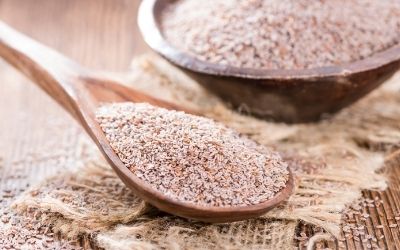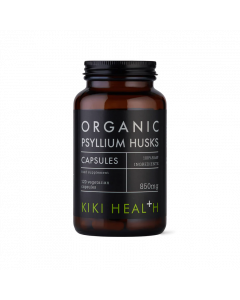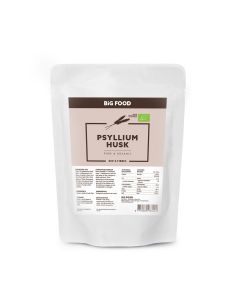What is psyllium husk?
- By Geertje (Gre) Haak
- 11 Mar 2021


What is Psyllium Husk? Psyllium fibers have grown in popularity in recent years. It is said to aid in weight loss, improve digestion and help regulate blood sugar. In this blog we will go deeper into these topics.
Psyllium husk or ispaghula, is the common name used for several members of the Plantago genus whose seeds are used commercially for mucilage production. The plant from which the seeds are extracted tolerates dry and cool climates and is mainly grown in North India.
What is psyllium fiber used for?
Psyllium fiber is mainly used to relieve intestinal problems such as constipation, diarrhea, leaky gut, chronic intestinal inflammation (Crohn's disease, ulcerative colitis) and IBS (irritable bowel syndrome) and according to some it is also helpful in weight loss. In addition, psyllium fibers are also used in hyperlipidaemia, metabolic syndrome, diabetes mellitus, (prevention) cardiovascular diseases, prevention of weight gain, obesity, prevention of gallstones (when losing weight) and dyslipidaemia during pregnancy (Source: Stichting Orthokennis).
Effect of psyllium fiber on cholesterol levels and type 2 diabetes
A study by The American Journal of Clinical Nutrition found that psyllium fiber can lower blood cholesterol in people with elevated cholesterol (Source: Oxford Academic) and lowers blood glucose levels in people with type 2 diabetes (Source: Oxford Academic).

Where does psyllium husk originally come from?
Psyllium is a robust herb that grows around the world, but is most common in India, which remains the largest producer of psyllium husks today. It is also referred to as Isabghol (Ispaghol in Pakistan), derived from the Sanskrit words "asp" and "ghol", collectively "dandelion". The whole seed has been used in traditional Iranian medicine for hundreds of years.
What parts of psyllium seed are used?
The inner seed is high in starches and fatty acids, making it an excellent natural additive for animal feed. The outer layer (the shell) is ground into mucilage, a term that describes clear, colorless, gelatinous dietary fiber that provides the most health benefits in humans and animals (Source: PDF IJsr.net).
Why take psyllium husk?
As mentioned earlier, psyllium fiber is believed to have a variety of health benefits. Here we explain a number of them.
Psyllium fiber for digestion
One of the main benefits of Psyllium fiber is its ability to provide regular bowel movements and aid in digestion. Diets that are high in protein or low in carbohydrates often lack fiber. This can negatively affect bowel movements and digestion. Psyllium fiber can help restore balance (Source: Stichting Orthokennis).
There are also indications that psyllium fibers can help in the intervention of Irritable Bowel Syndrome (Source: NCBI).

Psyllium fiber and weight loss
Psyllium fibers make you feel full. In combination with water, psyllium fibers expand in the stomach and this prevents a feeling of hunger so that it can support weight loss (Source: Pubmed).
Psyllium fiber is popular with bodybuilders and physical athletes as it regulates the feeling of hunger. This is especially ideal if you have a tightly arranged nutritional plan.
Positive effect of psyllium fiber on blood sugar
Psyllium fiber - and generally an increase in soluble fiber in a diet - is believed to help regulate blood sugar (Source: Oxford Academic).
For the above reason, psyllium fiber is loved by people with diabetes who want to lose weight - because they have to be extra careful about fluctuations in blood sugar.

Psyllium fiber side effects
Psyllium is generally considered safe when used as recommended, but it can cause certain side effects such as gas, bloating, stomach pain, diarrhea, and nausea (Source: Pubmed).
Although rare, an allergic reaction cannot be ruled out. Call your doctor right away if you experience symptoms such as:
- Difficulty breathing or swallowing
- Itching
- Stomach ache
How much psyllium fiber do you need?
It is best to start with a low dose and slowly increase the amount you take for one to two weeks until you reach the recommended dose. Mix psyllium fiber well with the recommended amount of water (usually a tablespoon is mixed in a glass of water).
Drink plenty of water when using psyllium fiber
It is important to drink enough water during the day. Taking psyllium fiber with insufficient fluid or in large doses can lead to intestinal obstruction. If your constipation gets worse while taking psyllium fiber, stop using it and contact your doctor.
Contraindications psyllium fiber
Psyllium should not be taken by people with acute stomach problems (such as appendicitis), intestinal obstructions or spasms, difficulty swallowing, colorectal adenoma, or a narrowing or obstruction anywhere in the digestive tract. People with kidney disease and those on certain medications may not be able to take psyllium supplements.
(Bron: Stichting Orthokennis)

 Low-carb psyllium husk buns recipe
Low-carb psyllium husk buns recipe
These delicious and easy-to-make psyllium husk buns are perfect for a low-carb diet. This way you still have the 'bread feeling' without the carbohydrates. Linda made a recipe video so you can make them too.
Ingredients psyllium husk buns:
- 130gr Greek yogurt
- 4 eggs (M)
- 40gr almond flour
- 30gr psyllium husk powder
- 10gr coconut flour
- 2 tsp baking powder
- pinch of salt
(Oven at 160 degrees)
Buy psyllium fiber










